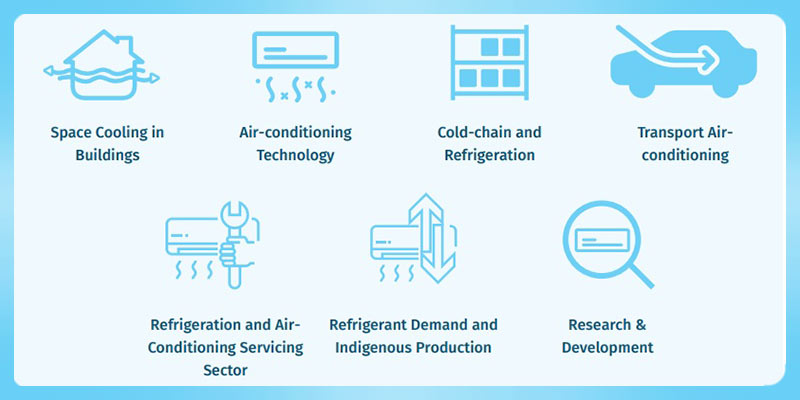- India
- Mar 16
Explainer / India Cooling Action Plan (ICAP)
The India Cooling Action Plan (ICAP) provides an integrated vision towards cooling across sectors, Union Minister Ashwini Kumar Choubey said in Lok Sabha.
Rise in requirement for cooling
• Cooling is linked with economic growth and is recognised as key to the health, well-being and productivity of people in hot climates. India is a growing economy characterised by low penetration of air-conditioning, rising per capita income, rapid urbanisation and a largely tropical climate all of which would lead to a rise in the requirement for cooling.
• Addressing the rising cooling requirement is both a challenge as well as a unique opportunity, necessitating synergies in policies and actions to address the cooling requirement across sectors even while making cooling sustainable and accessible to all.
• Increasingly, cooling is recognised as a developmental need that is linked with achieving many Sustainable Development Goals.
• A large part of the cooling demand is catered through refrigerant-based cooling globally across sectors such as buildings, cold chain, refrigeration and transport.
• Refrigerants used in cooling equipment are regulated under the Montreal Protocol regime.
• Another important aspect related to refrigerant-based cooling is energy use, resulting in a much larger portion of the emissions – nearly 70 per cent.
• According to the International Energy Agency (IEA), refrigeration and air-conditioning (RAC) causes 10 per cent of the global CO2 emissions.
India Cooling Action Plan (ICAP)
• The ICAP was launched in March 2019 by the ministry of environment, forest and climate change.
• The ICAP provides a 20-year perspective and outlines actions needed to provide access to sustainable cooling.
• The UN has highlighted the need for all countries to develop national cooling action plans.
• India is one of the first countries in the world to develop a comprehensive cooling action plan which has a long term vision to address the cooling requirement across sectors.
• Many countries are now involved in development of cooling action plans keeping in view the significant environmental benefits and the fulfilment of Sustainable Development Goals.
• The ICAP aims to reduce both direct and indirect emissions.
• The thrust of the ICAP is to look for synergies in actions for securing both environmental and socio-economic benefits.
• The ICAP has been appreciated internationally as an important policy initiative which has the potential to provide socio-economic and environmental benefits related to reduced refrigerant use, climate change mitigation and Sustainable Development Goals.
• The ministry has taken steps to operationalise the recommendations given in ICAP along with concerned line ministries and government organisations, industry and think tanks.
Goals of ICAP:
i) Reduce cooling demand across sectors by 20-25 per cent by 2037-38.
ii) Reduce refrigerant demand by 25-30 per cent by 2037-38.
iii) Reduce cooling energy requirements by 25-40 per cent by 2037-38.
iv) Recognise “cooling and related areas” as a thrust area of research under national science and technology programme.
v) Training and certification of 100,000 servicing sector technicians
Actions taken under ICAP:
i) Towards promoting passive cooling in buildings, the Bureau of Energy Efficiency (BEE) has brought out the Energy Conservation Building Code (ECBC) for all large commercial (non-residential) buildings and Eco-Niwas Samhita (ECBC-R) for residential buildings.
ii) Studies on promoting non-Ozone Depleting Substances (ODSs) and low global warming potential based technologies in cold chain, building sector and public procurement have been undertaken and reports have been published.
iii) To promote indigenous development of low global warming potential refrigerants, the department of science and technology has funded a research project to the Council of Scientific and Industrial Research (CSIR)-Indian Institute of Chemical Technology, Hyderabad.
iv) Indian Institute of Technology, Delhi, in collaboration with Bureau of Indian Standards (BIS) has undertaken a simulation study for developing safety standards for flammable refrigerants in the refrigeration and air-conditioning sector.
v) Upskilling and certification of 43,450 refrigeration and air-conditioning (RAC) service technicians has been undertaken under the national skill qualification framework (NSQF) of the Pradhan Mantri Kaushal Vikas Yojana (PMKVY). In addition, 29,000 RAC service technicians are being trained as part of implementation of Hydrochlorofluorocarbons (HCFCs) phase out management plans under the Montreal Protocol.
Manorama Yearbook app is now available on Google Play Store and iOS App Store



